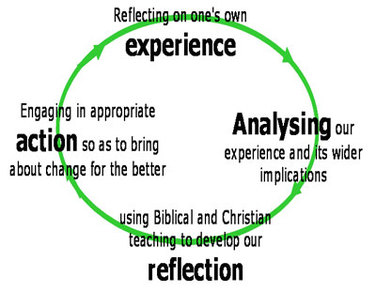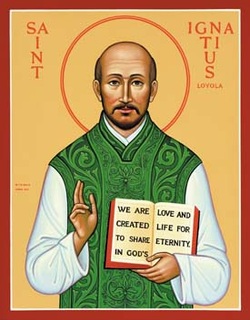 Pastoral Cycle Sometimes it is easy for any institution to become insular and self-serving and, perhaps naturally, concerned rather than survival rather than any real mission or purpose. Christian faith in Britain too is becoming seen simply as just one part of the ‘third sector’ as a provider of services or as a kind of recreation facility like bowling clubs or theatres. It is becoming seen as part of something bigger and not something in itself. Since the publication of its report Time to Talk of God in 2005, The Methodist Church has been seeking ways to reacquaint the Church—and the Christian disciple—with the wider world. As the report reminds the reader, everything a Christian believes and does is an aspect of discipleship; the goal of discipleship is to grow ever more Christ-like in every aspect of life. One of the ways churches in Britain have sought to do this is through the rise of Practical Theology which proposes the use of the pictorial ‘Pastoral Cycle’ (below), a four-stage guide on how to listen to God. It begins with an experience (an event; what happened and how did one feel). Next is exploration (why did it happen; what life experiences, knowledge and abilities did one draw on). The third stage is reflection (which theological issues are relevant). Finally, is the response (how is one challenged or changed by the experience). The intended consequence of this process is the ‘so what’ question: “what difference is it going to make next time I find myself in this situation?” The cycle should not return to where it originally started, but all this new learning and reflection hopefully takes a person onto a new place and into new situations. However, for some the worry is that the starting point of experience in the Pastoral Cycle belies the fundamental weakness of the approach: if the Church is of inherent value should reflection not begin with Scripture and Church teachings and not with experience?  Ignatius of Loyola The 31 July is the annual commemoration of Ignatius of Loyola. As a young man Ignatius was (in his own words) a man given over to the vanities of the world, and took a special delight in the exercise of arms, with a great and vain desire of winning glory. After a serious injury he was forced to convalesce for several months and it was during this time that he said he began to daydream that he was one of the early saints, leaving him at peace and not looking forward to battle. The Ignatian Method of prayer places oneself in the Biblical scene where you become a part of it by way of your imagination. Try to imagine what you might see...what you might hear...and what the persons in the scene might be doing. At each point in the contemplation, you are invited to draw some practical instruction from the reflection for your own life to-day. What changes and challenges does the reflection on the event deliver? It can be useful to read all the verses of the text 2 or 3 times, then read a verse and pause to meditate on it for a few moments and let the Spirit guide in how to pray and intercede with God (as described in Romans 8:26-27). As the Church commemorates Ignatius, perhaps the Ignatian Method is a valuable ameliorative basing our reflections from the outset in Scripture rather than in events. To conclude, a prayer of surrender penned by Loyola strongly reminiscent of the Methodist Covenant Prayer: Take, Lord, all my liberty, my memory, my understanding and my whole will. You have given me all that I have, all that I am, and I surrender all to your divine will. Give me only Your love and Your grace. With this I am rich enough, and I have no more to ask. Amen. Matthew Comments are closed.
|
Pastoral LettersWritten by the Minister & Members
|
 RSS Feed
RSS Feed